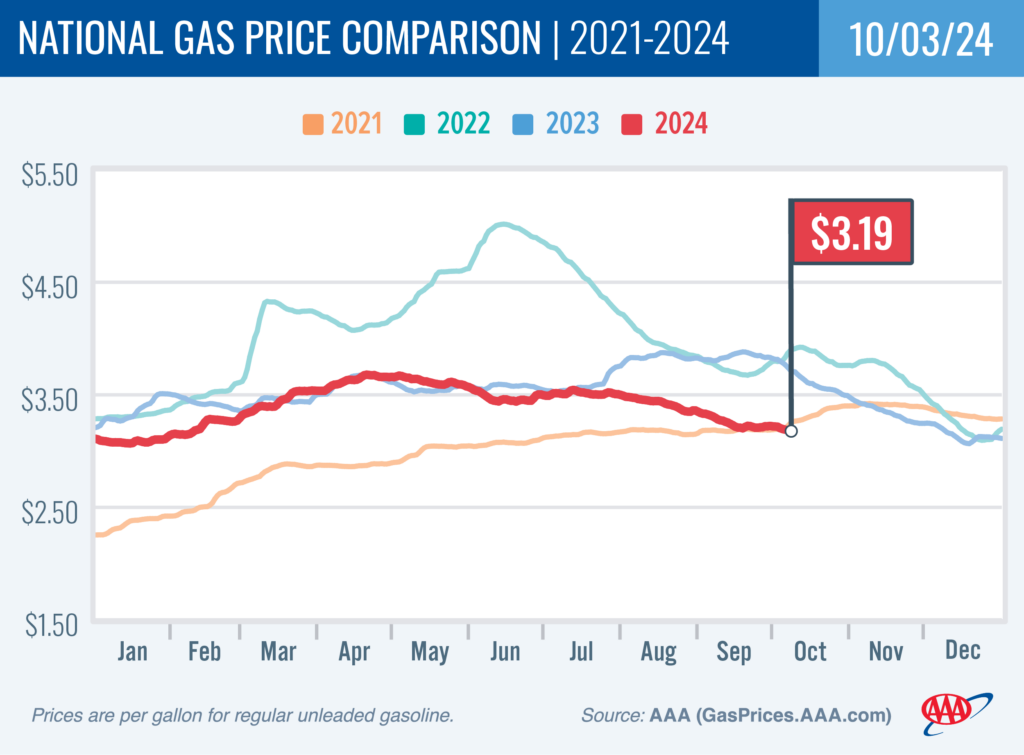WASHINGTON, D.C. (October 3, 2024)—Despite literal and figurative storm clouds here and abroad, the national average for a gallon of gas still fell by three cents from last week to $3.19. The devastation wrought by Hurricane Helene did little to impact gasoline supply, but it crushed demand in affected areas by destroying infrastructure and causing power outages. Meanwhile, the average cost of public EV charging remained unchanged.
Overseas, the ongoing tensions between Iran and Israel are fueling fears that a war could disrupt oil shipments through the Straits of Hormuz, a vital chokepoint for maritime traffic. This has led to oil prices creeping higher.
“Despite the threat of war and a hurricane season that is still percolating, domestic gasoline prices are edging lower,” said Andrew Gross, AAA spokesperson. “There are now 18 states east of the Rockies with averages below $3 a gallon. And OPEC+ is saying, at least for now, they will increase production starting December 1st, putting even more downward pressure on pump prices.”
With an estimated 1.2 million AAA members living in households with one or more electric vehicles, AAA tracks the average kilowatt-per-hour cost for all levels of public charging by state. Today’s national average for a kilowatt of electricity at a public charging station is 35 cents.
According to new data from the Energy Information Administration (EIA), gas demand plummeted from 9.20 million b/d last week to 8.52. Meanwhile, total domestic gasoline stocks rose from 220.1 million barrels to 221.2, while gasoline production decreased last week, averaging 9.6 million barrels daily. Tepid gasoline demand and low oil costs will likely keep pump prices sliding.
Today’s national average for a gallon of gas is $3.19, 13 cents less than a month ago and 60 cents less than a year ago.

Oil Market Dynamics
At the close of Wednesday’s formal trading session, WTI rose by 27 cents to settle at $70.10 a barrel. The EIA reports that crude oil inventories increased by 3.9 million barrels from the previous week. At 416.9 million barrels, U.S. crude oil inventories are about 4% below the five-year average for this time of year.
Quick Gas and Electricity Stats
Gas
The nation’s top 10 most expensive gasoline markets are California ($4.66), Hawaii ($4.60), Washington ($4.02), Nevada ($3.90), Alaska ($3.65), Oregon ($3.64), Utah ($3.51), Idaho ($3.47), Illinois ($3.47), and Michigan ($3.39).
The nation’s top 10 least expensive gasoline markets are Mississippi ($2.67), Tennessee ($2.72), Louisiana ($2.74), Alabama ($2.76), Oklahoma ($2.78), Texas ($2.78), Arkansas ($2.80), Missouri ($2.82), Kentucky ($2.85), and Kansas ($2.86).
Electric
The nation’s top 10 least expensive states for public charging per kilowatt hour are Kansas (22 cents), Missouri (24 cents), Delaware (26 cents), Nebraska (28 cents), Texas (29 cents), Vermont (29 cents), Wisconsin (30 cents), Michigan (30 cents,) Utah (30 cents), and North Dakota (30 cents).
The nation’s top 10 most expensive states for public charging per kilowatt hour are Hawaii (55 cents), West Virginia (45 cents), Montana (43 cents), Idaho (42 cents), Arkansas (42 cents), South Carolina (42 cents), New Hampshire (41 cents), Kentucky (41 cents), South Dakota (41 cents), and Alaska (41 cents).
The AAA Fuel Report will take a vacation later this month and will not be posted on October 17th and 24th. However, it will return on the 31st in time for Halloween. Boo!
Drivers can find current gas and electric charging prices along their route using the AAA TripTik Travel planner.
###
